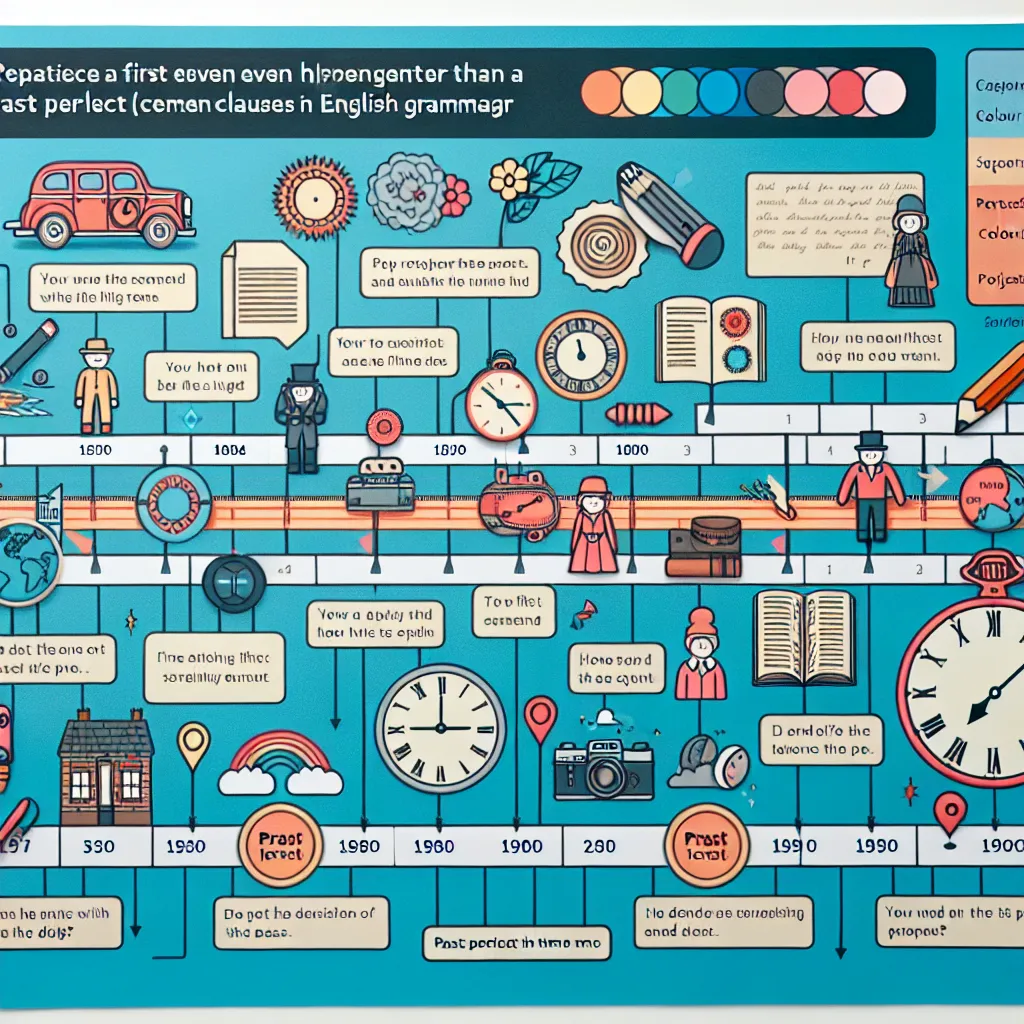The past perfect tense with time clauses is a crucial grammatical structure that frequently appears in IELTS exams. Understanding and effectively using this tense can significantly enhance your performance across all sections of the test. Let’s delve into the intricacies of this tense and explore how to apply it in various IELTS contexts.
Understanding the Past Perfect with Time Clauses
The past perfect with time clauses is used to express an action that occurred before another action in the past. It helps to establish a clear sequence of events and is often used in storytelling or when describing past experiences.
Formula and Grammar Rules
The basic formula for the past perfect with time clauses is:
Past Perfect: Subject + had + past participle
Time Clause: before/after/when/by the time + subject + simple past
For example:
- By the time I arrived at the station, the train had already left.
- After she had finished her homework, she went to bed.
- Before the concert began, we had eaten dinner.

Usage in IELTS Writing
In IELTS Writing Task 2, using the past perfect with time clauses can help you construct more sophisticated sentences and demonstrate a higher level of grammatical control. Consider this example:
Task 2 Question: Some people believe that studying the past has little value in the modern world. Do you agree or disagree?
Sample Answer Excerpt:
By the time humans had developed written language, they had already achieved remarkable feats in agriculture and architecture. This demonstrates that studying the past is crucial, as it reveals the foundations upon which our current civilization is built.
Application in IELTS Speaking
For the IELTS Speaking test, the past perfect with time clauses can be particularly useful when describing past experiences or narrating stories. Here’s an example:
Question: Describe a time when you had to make an important decision.
Sample Answer:
Well, I remember a crucial moment in my career when I had to decide whether to accept a job offer abroad. Before I made the decision, I had carefully considered all the pros and cons. By the time I finalized my choice, I had already discussed it thoroughly with my family and mentors.
Strategies for Achieving Higher Band Scores
To score higher in IELTS, it’s essential to use the past perfect with time clauses accurately and appropriately. Here are some strategies:
-
Varied Time Clauses: Instead of always using “before” or “after,” incorporate a variety of time clauses such as “by the time,” “as soon as,” or “no sooner…than.”
-
Complex Sentences: Combine the past perfect with other tenses to create more complex sentence structures.
-
Context Appropriateness: Use the past perfect when it’s necessary to show the order of past events, not just to showcase grammar knowledge.
Comparison of Band Scores
Band 6 Example:
Before I went to the interview, I prepared my documents.
Band 7-8 Example:
By the time I arrived at the interview, I had meticulously prepared all my documents and had rehearsed potential questions.
The higher band score example demonstrates more sophisticated use of vocabulary and a more precise sequence of events using the past perfect.
Common Mistakes to Avoid
-
Overuse: Using the past perfect for every past action, even when simple past would suffice.
Incorrect: Yesterday, I had gone to the store and had bought some groceries.
Correct: Yesterday, I went to the store and bought some groceries. -
Incorrect Time Clause: Using present tense in the time clause instead of past tense.
Incorrect: After I had finished work, I am going home.
Correct: After I had finished work, I went home. -
Mixing Up Tenses: Confusing past perfect with present perfect or past simple.
Incorrect: By the time I arrive, the movie has already started.
Correct: By the time I arrived, the movie had already started. -
Forgetting the ‘Had’: Omitting ‘had’ in the past perfect construction.
Incorrect: Before I left, I finished my homework.
Correct: Before I left, I had finished my homework. -
Incorrect Past Participle: Using the simple past form instead of the past participle.
Incorrect: She had went to the store before cooking dinner.
Correct: She had gone to the store before cooking dinner.
Conclusion
Mastering the past perfect with time clauses is a valuable skill for IELTS success. It allows you to express complex ideas about the past with precision and sophistication. Practice using this structure in various contexts, and remember to use it judiciously in your IELTS responses. For further practice, try incorporating this tense into descriptions of historical events, personal anecdotes, or hypothetical scenarios involving past actions.
To enhance your IELTS preparation, you might also want to explore related grammatical structures such as hypothetical clauses with ‘if only’ or sentences with ‘no sooner than’ in time clauses. These structures can complement your use of the past perfect and further elevate your language proficiency in the IELTS exam.